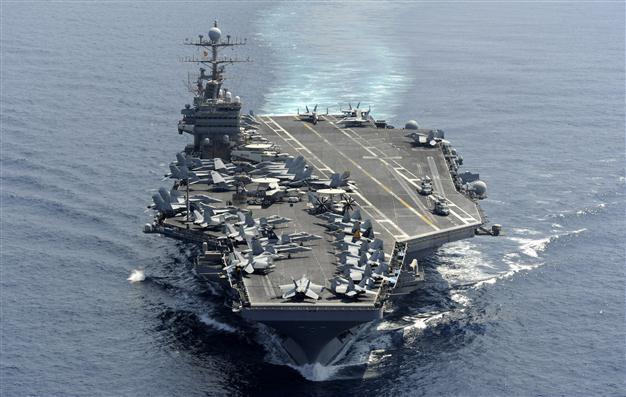US carrier in Gulf after Strait of Hormuz pass
WASHINGTON - Agence France-Presse

AP Photo
The US aircraft carrier USS Abraham Lincoln has passed through the Strait of Hormuz and is now in the Gulf, the Pentagon said, after Tehran threatened to close the strategic shipping route."USS Abraham Lincoln ... completed a regular and routine transit of the Strait of Hormuz ... to conduct maritime security operations as scheduled," Pentagon spokesman Navy Captain John Kirby told AFP via email Sunday.
"The transit was completed as previously scheduled and without incident." The carrier, which can have up to 80 planes and helicopters on board, was escorted by the guided-missile cruiser USS Cape St George and two destroyers.
Earlier, Britain's Ministry of Defence said a British Royal Navy frigate and a French vessel had joined the carrier group to sail through the strategic waterway.
While allied ships often participate in US naval exercises and sometimes are part of joint naval flotillas, the presence of British and French ships seemed to be a message to Tehran about the West's resolve to keep the route open.
"HMS Argyll and a French vessel joined a US carrier group transiting through the Strait of Hormuz, to underline the unwavering international commitment to maintaining rights of passage under international law," said a spokesman from Britain's MoD.
He said Britain maintained "a constant presence in the region as part of our enduring contribution to Gulf security." Iran's military and political leaders had warned they could close the strait -- a key transit route for global oil supplies -- if increased Western sanctions over Tehran's suspect nuclear program halt Iranian oil exports.
The Islamic republic's navy had also warned it would react if the United States tried to redeploy one of its aircraft carriers to the waterway.
Two of the 11 US aircraft carriers are currently in the region.
US Defense Secretary Leon Panetta has repeatedly said that closing the strait would cross a "red line." Since then, Iran has tried to ease tensions, with Foreign Minister Ali Akbar Salehi saying last week that Tehran had never tried to close the strait.
We want peace and stability in the region," Salehi said.
The United States, France, Britain and Germany accuse Iran of seeking to build a nuclear bomb, but Tehran says its nuclear drive is peaceful.
European Union foreign ministers meeting in Brussels on Monday are expected to agree to sanction Iran's central bank and announce an embargo on buying Iranian oil.
The 27 EU foreign ministers look set to agree new measures against Tehran after having already frozen the assets of 433 firms and 113 individuals, as well as restricting trade and investment in the oil and gas industries.
Also expected are bans on the sale of gold, diamonds and other precious metals to Iran and any delivery of newly minted coins and notes.
With tensions on the rise, Israel, for its part, fears a nuclear-armed Iran would pose an existential threat to the Jewish state and has refused to rule out a resort to military action to pre-empt it.
















